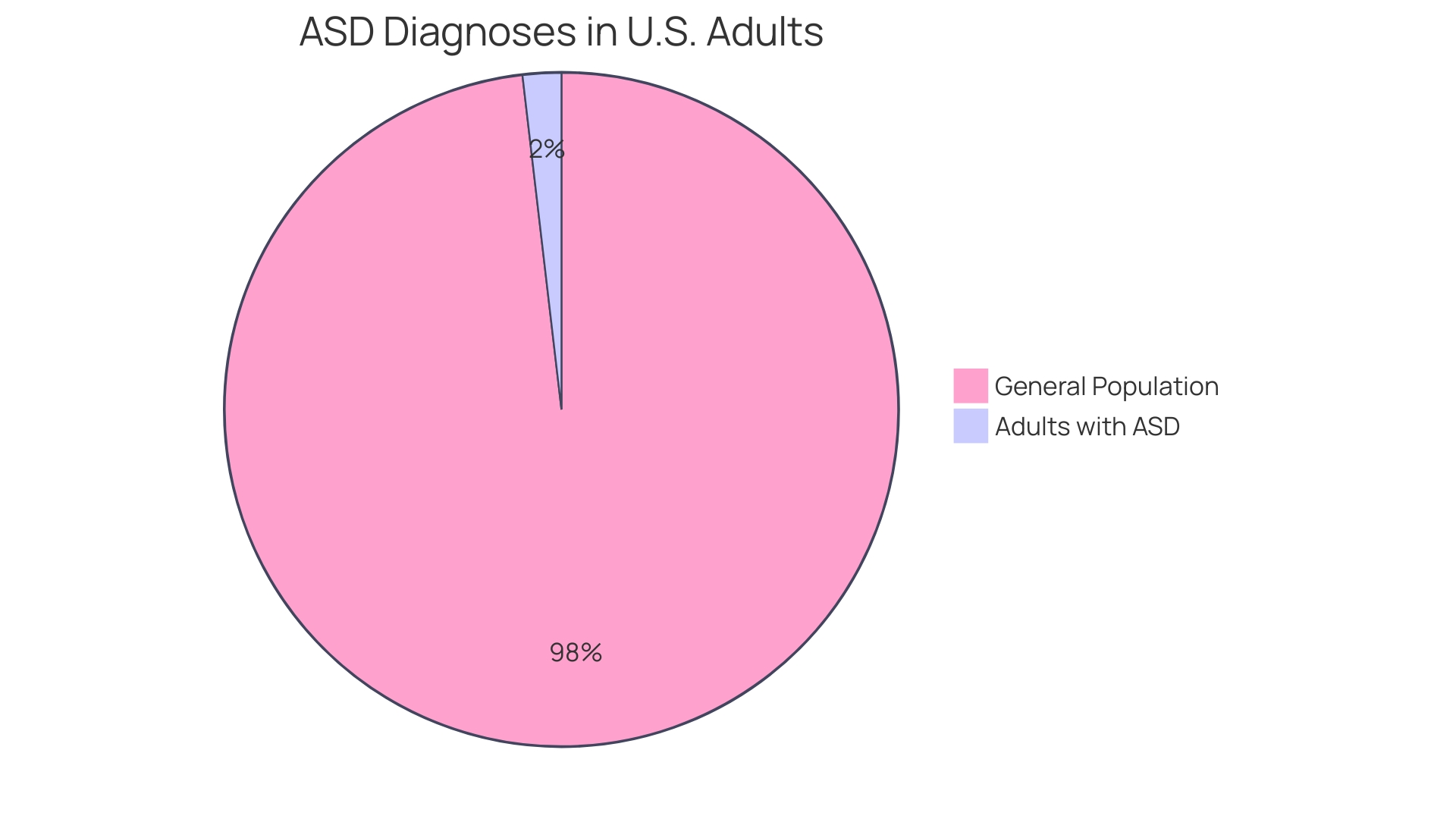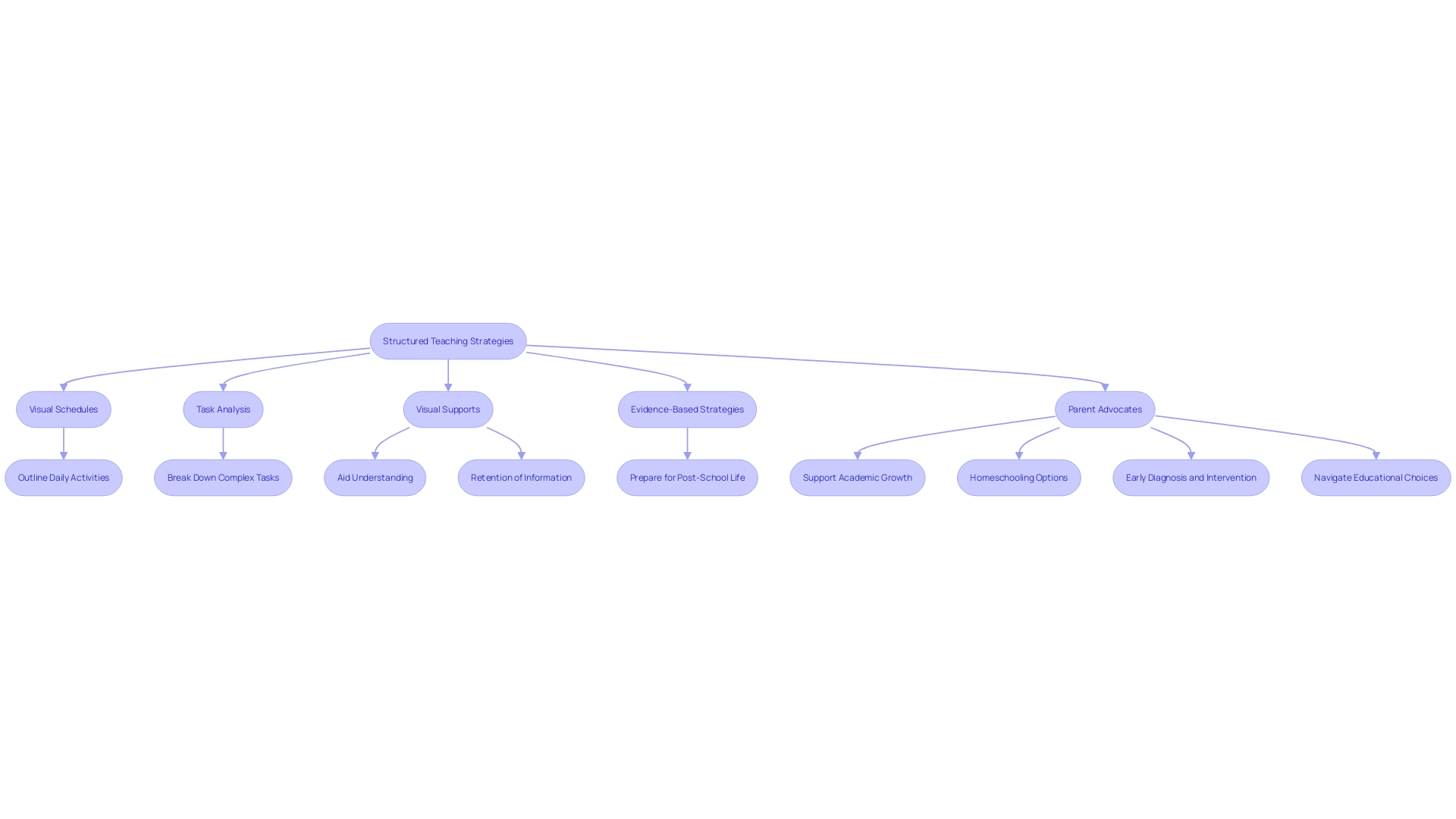Introduction
Autism Spectrum Disorder (ASD) affects a significant number of adults in the United States, yet many individuals remain undiagnosed. The challenges faced by those with ASD, such as difficulties in social communication and repetitive behaviors, require personalized support.
In this article, we will explore the role of parent advocates in navigating the educational landscape for children with autism, evidence-based practices for supporting children with ASD, strategies for improving written expression and handwriting skills, structured teaching strategies, and creating a supportive environment for children with ASD. By providing guidance and resources, this article aims to empower parent advocates in ensuring the well-being and success of their children on the autism spectrum.
Understanding Autism Spectrum Disorder (ASD)
Autism Spectrum Disorder (ASD) encompasses a broad range of conditions characterized by challenges with social skills, repetitive behaviors, and communication. Each individual with ASD presents a unique array of symptoms, making personalized support crucial. A staggering statistic reveals that 1 in 45 adults in the U.S. are diagnosed with ASD, highlighting the importance of increased awareness and advocacy.
Despite heightened public health campaigns and screening, many adults live without a diagnosis, potentially due to historical misdiagnoses or a lack of recognition of ASD traits. Adults with ASD often face difficulties in social communication and exhibit restricted, repetitive patterns of behavior, which are core signs of the condition. For those who suspect they or someone they know may be on the spectrum, understanding these signs is the first step toward identifying undiagnosed ASD and seeking the support they need.

The Role of Parent Advocates
Navigating the educational landscape for children with autism requires dedication and a proactive approach from parent advocates. With the Individuals with Disabilities Education Act (IDEA) focusing on preparing students for life beyond high school, including further education and employment, parents are instrumental in setting the stage for future success.
An increasing number of parents choose to homeschool their children with autism, a decision driven by various factors tailored to their child's unique needs. Early intervention is key, as most children present developmental warning signs long before the average diagnosis age of four years old. Amidst the complexities of the school system and the array of educational options, parent advocates are essential in deciphering the best path forward and championing the needs and potential of their children.
Evidence-Based Practices for Supporting Children with ASD
Navigating the landscape of interventions for children with Autism Spectrum Disorder (ASD) can be daunting for parent advocates. It's crucial to lean on scientifically backed practices, which have been rigorously tested and proven to yield positive outcomes.
Applied Behavior Analysis (ABA), social skills training, and sensory integration therapy stand as beacons of evidence-based methods, offering a structured approach to support children with ASD. However, it's imperative to acknowledge that intervention research is not without its flaws.
Critical evaluations reveal that many studies bear design shortcomings, obscuring the true effectiveness, scope, and safety of these interventions. Parents and professionals must scrutinize these studies with a discerning eye, understanding that the quality of research is not just an academic concern but a matter of deep respect for the autism community. This respect is evidenced by the shift from quasi-experimental to the more rigorous randomized-controlled trials in autism research. Informed by the latest findings, parent advocates are better equipped to champion interventions that are both ethical and effective, ensuring that their advocacy is grounded in the best available evidence.
Improving Written Expression in Children with ASD
Written expression can be a challenge for many children with ASD. Parent advocates can support their children in improving their written expression skills by implementing strategies such as visual supports, structured writing prompts, and breaking down tasks into smaller, manageable steps. By providing the necessary support and accommodations, parent advocates can help their children develop and enhance their written communication abilities.
Handwriting Strategies for Children with Autism
Handwriting can be a difficult task for children with autism due to fine motor challenges and sensory sensitivities. Parent advocates can employ various strategies to support their children in improving their handwriting skills.
These strategies may include using adapted writing tools, providing sensory breaks, and incorporating sensory-friendly materials. By addressing the specific needs of their children, parent advocates can help them develop confidence and proficiency in handwriting.

Structured Teaching Strategies for Students on the Autism Spectrum
To enhance the educational journey for children on the autism spectrum, it is essential to focus on structured teaching strategies. These strategies not only foster a conducive learning environment but also address the unique challenges faced by these students. Essential elements of this structured approach include the use of visual schedules to outline daily activities, task analysis to break down complex tasks into manageable steps, and visual supports to aid understanding and retention of information.
While research indicates that the majority of non pharmacological intervention studies suffer from design flaws, limiting the clarity of their effectiveness and potential side effects, parent advocates can still draw upon the broader understanding of these interventions to support their children. Moreover, the autism community's active role in critiquing and improving research practices underscores the importance of respectful and high-quality intervention research. As a result, parent advocates are empowered to adopt evidence-based strategies that respect the dignity of children with autism and support their academic growth.

Creating a Supportive Environment for Children with ASD
Parent advocates are essential in championing the needs of children with Autism Spectrum Disorder (ASD). Their advocacy efforts extend to ensuring that inclusive education is not just a concept, but a reality. By working alongside educators, parent advocates contribute to the crafting of individualized education plans (IEPs) that are tailored to each child's unique learning requirements.
Beyond the educational sphere, they are instrumental in cultivating a culture of acceptance and understanding within the community. Their work paves the way for children with ASD to access a variety of resources and opportunities, which are critical for their growth and development. This collaborative approach taken by parent advocates significantly impacts the well-being of their children, empowering them to reach their fullest potential in a nurturing and accommodating environment.
Conclusion
In conclusion, this article has highlighted the importance of understanding Autism Spectrum Disorder (ASD) and the challenges faced by individuals with ASD. It emphasizes the role of parent advocates in navigating the educational landscape for children with autism, providing personalized support, and championing their needs.
The article also discusses evidence-based practices for supporting children with ASD, such as Applied Behavior Analysis (ABA), social skills training, and sensory integration therapy. It emphasizes the need for parent advocates to critically evaluate research studies to ensure that interventions are both ethical and effective.
Furthermore, the article provides strategies for improving written expression and handwriting skills in children with ASD. It suggests using visual supports, structured writing prompts, adapted writing tools, and sensory-friendly materials to enhance communication abilities.
Structured teaching strategies are also highlighted as essential for students on the autism spectrum. Visual schedules, task analysis, and visual supports are recommended to create a conducive learning environment and address the unique challenges faced by these students.
Lastly, the article emphasizes the importance of creating a supportive environment for children with ASD. Parent advocates play a crucial role in ensuring inclusive education and collaborating with educators to develop individualized education plans (IEPs) that meet each child's needs. They also contribute to cultivating a culture of acceptance and understanding within the community. Overall, this article empowers parent advocates by providing guidance and resources to navigate challenges and ensure the well-being and success of their children on the autism spectrum. By championing their children's needs and utilizing evidence-based practices, parent advocates can make a lasting impact on their children's lives.




